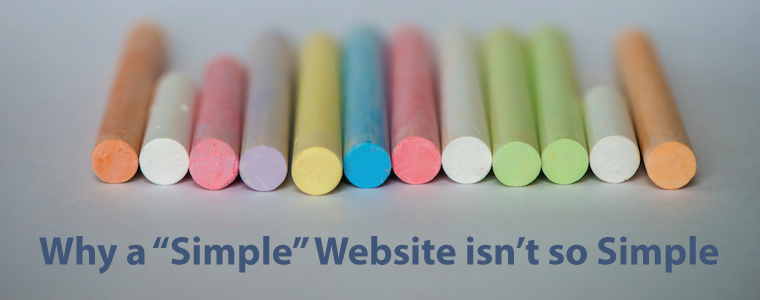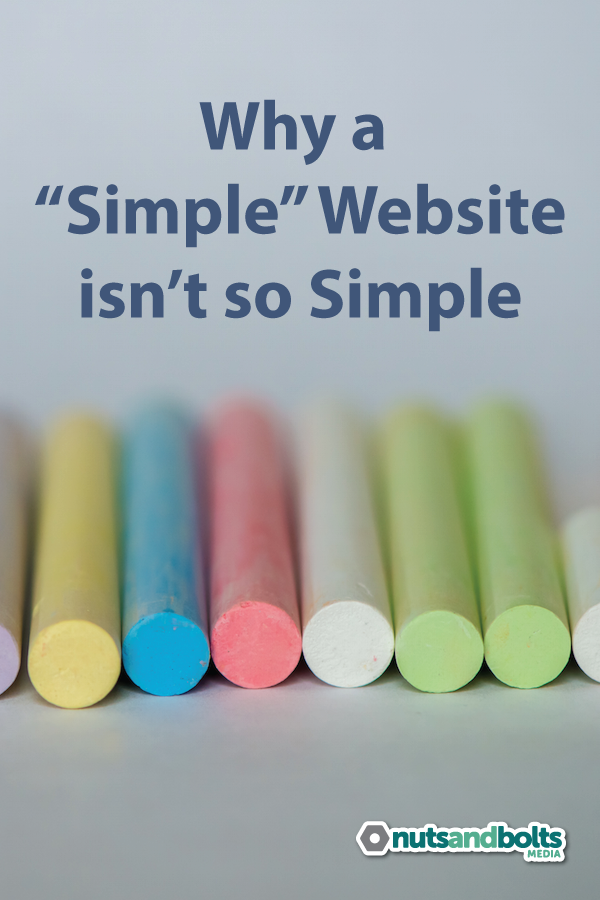Want to know the best way to make a designer or developer run away screaming? Tell him or her, “I just need a simple website.”
When I see those words in a quote request, that’s an automatic, “Sorry, but I don’t think I’d be the best fit for your project.” Why? Because “simple” projects are never, ever simple. And when potential clients assume their projects are worth less effort, they’re telling me they don’t value my work or their own businesses enough to expect better.
Here are five reasons why your request for a “simple” website is a red flag:
(1) Clients who use the word “simple” are generally looking for a discount.
The word “simple” almost always comes in the form of a rebuttal. “I shouldn’t have to pay your normal rate because my needs aren’t as complicated as your typical client’s needs.”
Oh, really? So you know all my clients and how much work I put into their projects? Interesting!
If you knew how to build your own website, I assume you would do it yourself. But because you are offering to pay me to do it for you, that means we agree that I know things you don’t. I’d love to see someone attempt to do this with a doctor – “My heart surgery is just a simple one! It shouldn’t cost as much as those other patients’ heart surgeries!”
(2) “Simple” projects tend to be nightmares.
Last fall I took on a “simple” website build against my better judgment. Two million revisions later when the client was finally satisfied, I’d estimate that I made maybe 30 cents per hour on the project.
Ever notice that people get angry when McDonald’s gets their order wrong? In a nice restaurant, the person might politely mention an error to the server, but I have seen people in drive thru windows come absolutely unglued. Why? Because we don’t pay enough at a fast food restaurant to respect the employees. We feel we can berate them for a simple mistake because “the least they could do is get my order right.”
Similarly, when someone underpays a designer or developer, s/he sees that person as unworthy of respect. The client isn’t collaborating with the web professional to meet her goals for the site; she is placing an order and expects to have it her way.
(3) “Simple” websites don’t automatically require less work.
Out of all the services I offered as a freelancer, there was no “crappy, half-ass website” option. When I built a website for a client, I didn’t create an uglier logo because the person paid less money. I didn’t pay less attention to my code because the site only has five pages. I didn’t put any less effort into security because a “simple” site doesn’t deserve to function well.
I do my best work no matter what the project is because that’s how I’m wired. Any other reputable designer or dev would be the same way. And I apply the same knowledge and years of experience to each project I complete regardless of the details.
(4) “Simple” is highly subjective.
What exactly does it mean to ask for a “simple” website? Does that mean it has fewer pages? It doesn’t need a sidebar? It’s guaranteed to take me half the time another project might take? It’s a carbon copy of something I’ve done before?
Until someone can define “simple” as it applies to the work I do, I’m going to continue assuming that it means “I want to pay less.” And since I don’t do websites for $150 or cater to the bargain crowd, I’ll continue turning down those projects.
(5) “Simple” is unfair to you as the client.
Why do you want a simple website? Is it because you don’t value your own brand or business enough to want an awesome one? You don’t believe in what you’re doing and can’t justify investing in your success?
Yes, you can pay less for a subpar website that doesn’t do what you need it to do. But how do you stop feeling like you’re shortchanging yourself? Why look around wistfully at all the amazing websites out there and make the conscious decision not to aim for something just as cool on your own site?
When I hear a potential client ask for a “simple” website, I hear that person saying, “I’m not confident enough to expect the best work you can do, so I’d prefer to settle for something generic and nitpick it to death.” And that’s the kind of project I can’t get onboard with, because I can’t stand the idea of giving someone less than they deserve. At the same time, I also can’t stand the idea of living without electricity and food, so I don’t take on “simple” projects anymore; I value my work as much as I expect clients to value theirs.
“Simple” Websites – Just Say No!
If you are looking to hire a designer and/or developer to build your website, don’t disrespect their work or your own. Don’t expect lower prices and don’t settle for lower quality. It’s just like buying a car – you can spend $500 now and get something that will last a year or so, or you can spend more and benefit from it for many years to come.
If you’re a designer or dev looking for new clients, have some respect for yourself – don’t take on “simple” projects or charge less for your knowledge and skills. Instead, point those people to this article and explain to them that you value your clients too much to give them less than your best.



Love this article so well said.
Everything you say is true.
I took a job last year on the recommendation of a common friend, and I knew I’d made a terrible mistake when the word ‘simple’ was used. Clients who use this word typically have no clue what it takes in skill, time and actual work to develop, launch and maintain a website. They think that you can just throw something up and make endless changes at a whim, and at no additional cost or trouble to him.
When attempting to collect the final installment of the agreed contractual fee, excluding extra work I’d done to make this project go away, he refused to pay and demanded twice the number of product photos and descriptions. He threatened to sue when I wouldn’t do it. I dared him, since I’d fulfilled and exceeded original terms. The End.
Ouch, Kat – totally feel your pain! That kind of thing has happened to me more times than I can count, minus the threat of a lawsuit. It really makes me sad to see how many people have a totally unrealistic view of how web design/development works and the kind of effort it takes to get a site live. I spent most of 2013 in a state of “how to make this project go away” and have vowed to do better in selecting my clients this year. So far so good!
I would like to bestow 1000 likes upon this post – brilliant!
Thanks, Lucy! 🙂
This is an ancient article,
so comments are now closed.